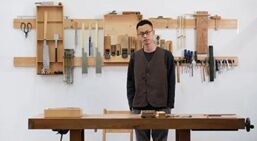90后小伙辞职回成都做木匠,火了!
|
仅仅摇摇手柄、按下按钮或者拉拉绳子,俞宸睿创造的木偶就可以奇迹般地动起来。在他鬼斧神工般的创作下,木头不仅动了起来,还能讲述非常精彩的故事,吸引了许多观众。 Yu, 29, is a maker of automata, self-propelled, artistic mechanical figures, in Chengdu, Sichuan province. Automata are built to look like humans or animals and give the illusion of being able to move on their own. "The art form amazes me, because it integrates various skills, from storytelling to mechanics, and the pieces are built with a sense of humor," Yu says.
In an age of technology, this is undoubtedly a marginal sector. Yu estimates that it has attracted no more than 10 full-time makers and practitioners across the country. His creations have caught the attention of renowned artists, such as Paul Spooner from the home of automata making in the United Kingdom and Kazuaki Harada from Japan. On social media, Spooner applauded Yu as "a great practitioner". In February, Kazuaki recommended him for the Automata Program during this year's World Wood Day. With prices ranging from hundreds to tens of thousands of yuan, his whimsical pieces of art have attracted collectors worldwide. "A fascinating thing about automata is that it delights people of all ages. Adults appreciate them as art, while children see them as toys to be played with," Yu says, smiling. The automata story has its origins in ancient Greece. Indeed, the name comes from the Greek word automatos, meaning "moves on its own". Automata were the first complex machines produced by man, and the mechanical principles applied haven't changed for thousands of years. Going Against the Grain Interested in handcrafts as a boy, Yu first encountered automata designed by Kazuaki at an exhibition in 2015 when he studied at the Communication University of China in Beijing. "It was like meeting a like-minded friend," Yu says, recalling the moment. As an art and design major, he began to learn the craft by himself and, with the support of his tutor, he kept studying and examining automata in school. The pieces that seem to move effortlessly take a beginner a long time to make. It can take Yu more than a year to ensure his mechanical sculptures move smoothly. When he graduated in 2016, Yu landed a job at an advertising agency near Shichahai, a popular scenic area in Beijing. He stayed on at the company for three years because, at that time, he was not sure that he could make a living out of his hobby. While working as a designer, Yu kept exploring and advancing his skills in wood carving and mechanics. Eventually, though, despite the job's good salary, it was not enough to compensate for not following his true passion. Every day, when he walked alone along the Shichahai lake, he watched ducks swimming, foraging and diving. He envied, in a way, their freedom to do as they pleased. "Every time I would encounter the ducks, I would ask myself if I was doing what I wanted, and if I was happy with my life," Yu remembers. The ducks inspired his automaton creation entitled Search for Self, in which a duckling swims happily in a circle. At the same time, an older duck seems unsure of what its life is about. The younger bird seems unconcerned, and is just happy to play. At an exhibition, when a girl saw the piece and asked why the duck kept searching but finding nothing, Yu heard her grandmother's interpretation, which of course was exactly how he wanted the piece to be explained. The grandmother said that, because humans change as time goes by, searching for yourself is a lifelong process, and doubts may come with age. Finally, in 2018, Yu quit his job and returned to Chengdu to open his automata workshop. The studio he rents exceeds 200 square meters, and Yu has spent more than 300,000 yuan ($46,000) refurbishing it. Just after finishing the renovation, Yu didn't know what to do and worried about cash flow. To keep himself occupied he planted blueberries, raspberries and cherries. He watered, weeded and added fertilizer every day. "Daily routines helped me calm down and reignited my creativity, which resulted in an automaton called To Observe the Autumn," Yu says. The pendulum installation tries to show how lovely and short autumn is. Over time, Yu's reputation grew and his business flourished. Many of Yu's creations are built with a dash of wisdom, a sprinkle of humor and are inspired by observations of real life. Woodcutter and Worm is derived from his own experience of finding a wormhole while cutting wood. Yu knows that there are many more creative ideas waiting to be expressed. "It feels quite good to be fully devoted to automata creation and I am still searching for myself." Although the origin of automata dates back thousands of years, Yu doesn't reject applying modern techniques. "Modern technology makes mass production of my automata possible, which can make the art form more popular and allow it to be enjoyed by more people," he says. "I hope it can be enjoyed by people of all ages, and makes them feel more connected and happier," Yu says. |









